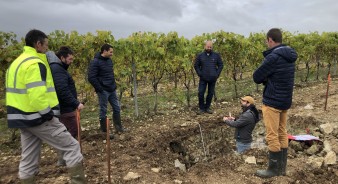


Regenerative agriculture pilots
Objective
To nurture and regenerate their terroir, creating harmony with nature.
To ensure that vines adapt to climate change.
To build a system that is resilient to climate phenomena.
By 2030:
- 100% of their land (720 ha) to use regenerative agriculture.
- 100% of their partners certified in sustainable viticulture.
- 10% of their supplies to come from committed winegrowing partners.
Description
Martell Mumm Perrier-Jouët (MMPJ) products come from nature and take their distinct character from the land where they were grown. MMPJ’s business is inherently dependent on the vitality of their agricultural ingredients: preserving agricultural lands and ingredients is paramount. In this direction, MMPJ have been developing sustainable agriculture practices for years and have achieved some of the highest environment certifications.
As part of its Sustainability & Responsibility roadmap, MMPJ stepped up its commitment and launched regenerative agriculture pilots in its own vineyards as of 2021. Their goal is clear: to nurture and regenerate their terroir, creating harmony with nature. The roadmap is as follows:
- 2020: Definition of 2020-2030 priorities and action plan.
- 2021: Experimental creation of regenerative vineyard after harvest, collection of results, reorientations and improvements.
- 2025: Transfer of new viticultural models to winegrowing partners by means of progress groups.
Regenerative viticulture is a holistic approach that encompasses the entire vineyard ecosystem. It involves a threefold approach:
- Restoring soil potential (they have audited and mapped their terroir to improve knowledge and adopt practices appropriate to its specific characteristics) to safeguard its essential role of storing carbon for plant growth;
- Preserving and restoring biodiversity, in particular by using plant cover to enhance soil fertility and providing a habitat for pollinators and regulating species harmful to the vine;
- Focussing on plant-soil interaction to guarantee nutrition and natural protection to reduce dependence on chemicals.
This approach results in a balanced, fertile, living soil, rich in bacteria, fungi and earthworms making vines more resilient to climate change. All of this takes place within a preserved environment in which biodiversity can thrive. Planning and implementation are the responsibility of a working group composed of MMPJ’s own teams, winegrowing partners, and Sébastien Roumegous, an expert in agroecology.
Raising awareness: MMPJ wish to lay the foundation of this transformation with immediate effect, and share new knowledge in complete transparency, beginning with their winegrowing partners. They therefore multiply training and awareness initiatives such as through their Technical Days to share skills in areas such as soil functions and biology, plant cover and bio-stimulation.
Partners
Sébastien Roumegous, a world-renowned expert in agroecology. He is the CEO and Founder of BIOSPHERES, as well as a member of the French association Pour une Agriculture du Vivant, of which Pernod Ricard is also a member.
Results
As of February 2023:
- Over 2,000 trees and shrubs have been planted on land in Cramant and Mailly, in consultation with experts from Biosphères and Reforest’Action.
- 19 regenerative agriculture initiatives including seven in their own vinyards.
- 82% of their affiliates have implemented a regenerative agriculture or biodiversity programme.
- 10,500 farmers have been empowered,trained or supported.
The first results of this regenerative agriculture program are expected for 2025. However, as of 2022:
- There are 339 Ha in trials.
- A total of 456 hours of training has been spent at the Technical Days.
- 200 winegrowing partners have been reached by awareness-raising action.
- Earthworms have returned within only 2 years to certain plots (instead of the usual 4 to 5 years to restore soil).
- 8 projects have been launched such as the Viti-Forestry project (launched in 2022) in the Gallienne and Mailly vineyards. It focuses on testing positive interactions between vines and their direct environment: introduction of animal species such as bluetits and bats, or other plant species, such as fruit-bearing hedges, aromatic herbs and medicinal plants.
- MMPJ is also in the process of building a group of 10 motivated partners to set up their own pilot programmes by offering them advice and support to develop and monitor the programmes.
 Downloads
Downloads
Photo gallery











